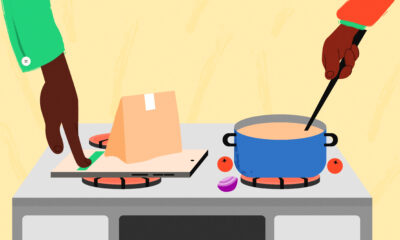News
Arit Okpo: Divided We Fall
 I was on Twitter recently and started to follow a conversation thread; some people were chatting about their experiences in the North and for some reason, it alarmed me; partially because all the experiences were bad, all also because more and more, I notice a “Those people” tone in conversations about the North.
I was on Twitter recently and started to follow a conversation thread; some people were chatting about their experiences in the North and for some reason, it alarmed me; partially because all the experiences were bad, all also because more and more, I notice a “Those people” tone in conversations about the North.
For a long time we’ve mocked the international press for their insistence on dividing Nigeria into a “Muslim North” and a “Christian South”. We mock because it is a very simplistic approach to the situation and shows a lack of understanding of Nigeria’s complexity, but somehow I worry that perhaps more of us are absorbing this mindset than we probably realise.
I served in the North – Zamfara to be precise. My experience was on the whole, positive. I started to speak passable Hausa, mostly because when I carried my guidebook to the market, the traders were so happy to see a non-Northerner speaking their language that they would correct me happily as I tried to ask how much tomatoes were or if this was today’s meat.
I used to chat with some deaf people who hung out by the market place. Unknown to me, they went to the State Directorate for Special Education to tell them about the corper who knew sign language. I was offered a job, with the department for Special Education in Gusau, sight unseen for that reason.
We interacted a little with the people around us, the corpers lodges were we stayed were in the school themselves and I learned to make accommodations for the culture I was in. I rarely went out head uncovered and my skirts were rarely above the knees. I wasn’t the only one.
When I started service, an older corper gave me some “advice”. “These students; you must flog them well or they won’t listen”. I approached my class with trepidation; 70 boys who were almost all much taller than I was. How would I cope? I expected sullenness and silence. I met bright young minds who would regularly divert my Chemistry class with questions like “Mallama what is winter?’ “Mallama what does Abuja look like?” I asked questions of them too, like “Why don’t you come to school regularly?” The answer, from a quiet young man; he was married, with his cows and a farm, what did he need school for? And I realised that I had no answer. Why should he come when no one had explained to him that education would help his farm yield more, help him nurture his cows, help him ensure that his wife gave birth in safety and his children grew up healthy. Chemistry lessons had no relevance to him; why had no one thought to structure the education system so that it would be relevant to him?
In Zamfara, the NCCF house in Gusau was a gift to NCCF by the State Government. It’s a huge expanse of land – enough land for an estate, on the outskirts of town. The Governor who gave them the land told the corpers that he wanted them to feel at home in the state and not to worry about the fact that it was a Muslim State.
I’m not painting an overly rosy picture – there were taxis that wouldn’t carry me because I was female, people who would not speak to me. But to be honest, I have also gotten the same reaction from Southerners – distrust, suspicion, closed minds.
One of the reasons why I mourn what Federal schools have become is because we learned early that these differences were not the things that defined us. When I was in school, an overzealous prefect decided that some Northern students should be punished for lining their eyes in what she thought was defiance of the no makeup rule. The Northern girls protested; lining their eyes was a part of their culture and wasn’t considered makeup. The punishment was quashed and the rest of us briefly considered claiming Northern ancestry so that we could line our eyes too.
It’s a silly example but this is my point – we were learning about one another.
My friend Fatima taught me about ablution and its significance for a Muslim. If I went to her house when she was about to pray, she would settle me in her room with a movie and a drink and then go into her corner to pray. On Christmas day, my first message would likely come from her. During Sallah, I would send her prayers and best wishes. She introduced me to Borno cuisine. I learned about her ways, she learned about mine.
When my family moved to Abuja, our landlord’s wife who we became quite friendly with would explain certain parts of her culture to us, contrasting them with ours and explaining why it was so.
When I had a church fast, another Muslim friend of mine would make meals for me each day to break my fast. She used the opportunity to teach me a little about Ramadan and we compared our different reasons and rules for fasting.
If there is any point I am trying to make with this piece, it is this – that we seem to have stopped learning about one another, and have changed our viewpoint to one of suspicion and collective mistrust, that we have lumped the good with the bad and have condemned all together. The systems that were designed to teach us unity have failed us; how can we learn about other parts of Nigeria when we are all working our service to Abuja to work in NNPC? Our Unity schools have lost the essence of the name. Our Universities, designed to be regional centres of excellence are becoming a shadow of themselves.
If we should be angry at anything, let us get angry at the fact that these structures have not been maintained or allowed to evolve. They have become a sad shadow of what they were created to be and in the process, have ensured that the cords that were supposed to knit us together have become a tangled mess.
We have common threads, the ways in which we are similar are – believe it or not – more than the ways in which we are different. We love, we bleed, we cry, we die, we are hungry, we pray, we live. No matter which part of Nigeria we come from…no matter how many bombs explode…this is my plea – let us not let go of the fact that we are one.
Photo Credit: Dreamstime.com/AmericanSpirit
_______________________________________________________________________________________________
Arit is a Producer and Presenter on EbonyLife TV. She puts together EL Reports – a daily news show on the channel that celebrates Africa. She loves to write and is constantly inspired by the stories in people’s everyday lives. She daily challenges herself to live a life of gratitude. She tweets complete randomness @menoword






















